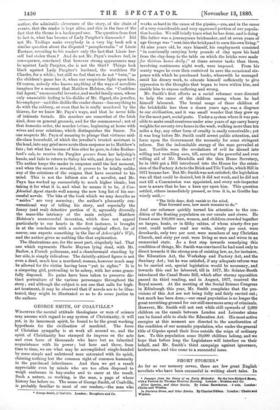GEORGE SMITH, OF COALVILLE.* WHATEVER the mental attitude theologians or
men of science may assume with regard to any system of Christianity, it will yet, in its innermost spirit, be found to be the great working hypothesis for the civilisation of mankind. The force of Christian sympathy is at work all around us, and the spirit of Christianity has stamped its impress on the acts and even faces of thousands who have but an inherited acquaintance with its power ; but here and there, from time to time, we see what may be accomplished single-handed by some simple and unlettered man saturated with its spirit, claiming nothing but the common right of common humanity in the purchased inheritance. And then we get a result appreciable even by minds who are too often disposed to weigh sunbeams in hay-scales and to sneer at the result. Such a nature, so working, is the man, a page of whose history lies before us. The name of George Smith, of Coalville, is probably familiar to most of our readers,—the man who
• George Smith, of Coalcille. London : Houghton and Oo.
works so hard in the cause of the gipsies,—yea, and in the cause of a very considerable and very oppressed portion of our popula- tion besides. We will briefly trace what he has done, and is doing His father was a journeyman brickmaker, and at seven years of age George was " sent into the brickyard to earn his own living." At nine years old, he says himself, his employment consisted "in continually carrying forty pounds of clay upon his head from the clay-heap to the table on which the bricks were made for thirteen hours daily;" at times severer tasks than these, involving continuous night work, were imposed. From his scanty wages he even then contrived to save the occasional six- pence with which he purchased books, wherewith he managed amid his dreary work, to educate himself sufficiently to give expression to the thoughts that began to burn within him, and enable him to expose suffering and wrong.
Mr. Smith's first efforts as a social reformer were directed to help the cause of the children among whom he had himself laboured. The brutal usage of these children of the brickfields less than a dozen years ago, was a disgrace to our civilisation, and it was small wonder that they grew up for the most part, social pests. Under a system where it was pos- sible to make small creatures under nine years of age carry heavy weights for seventy-two hours in the week, walking more than ten miles a day, any other form of cruelty is easily conceivable ; yet it was long before Mr. Smith could arrest public attention, and force upon the Government the necessity for some stringent reform. But the indomitable energy of the man prevailed at last. Terrible were the revelations of evil he dinned into willing and unwilling ears, till, securing the powerful and ever willing aid of Mr. Mundella and the then Home Secretary, he in 1864 got a Bill introduced into the House for the exten- sion of the Factory Acts to the Brick and Tile Yards; which Bill in 1871 became law. But Mr. Smith was not satisfied; the legislation was all that could be desired, but it did not work, and he did not rest till a Commission was appointed, and every sub-inspector now is aware that be has a keen eye upon him. This question settled, others immediately pressed, so true it is, as Goethe has wisely said,-
" The little done, doth vanish to the mind,
That forward sees, how much remains to do."
And our reformer quickly turned his attention to the con- dition of the floating population on our canals and rivers. He found some 106,000 men, women, and children crowded together on barges, boats, or in filthy cabins, of whom ninety-five per cent. could neither read nor write, ninety per cent. were drunkards, only two per cent. were members of any Christian Church, and sixty per cent. were living as men and wives in an unmarried state. As a first step towards remedying this condition of things, Mr. Smith was convinced he had need only to direct towards it the strong arm of existing law, as, for instance, the Education Act, the Workshop and Factory Act, and the Sanitary Act; but he was satisfied, if any adequate reform was to be carried out, special legislation would be necessary, and towards this end he laboured, till in 1877, Mr. Solater-Booth
introduced the Canal Boats Bill, which after stormy opposition passed its third reading, and in August, 1877, received the Royal assent. At the meeting of the Social Science Congress in Edinburgh this year, Mr. Smith complains that the pro- visions of this Act are not being fully and fairly carried out ; but much has been done,—our canal population is no longer the great recruiting-ground for our still enormous army of criminals. However, Mr. Smith will not rest while still upwards of 2,000 children on the canals between London and Leicester alone can be found able to elude the Education Act. His most active energies at this moment are directed to the amelioration of the condition of our nomadic population, who under the general title of Gipsies spend their lives outside the reign of ordinary law. To this population some 30,000 children belong, and-we hope that before long the Legislature will interfere on their behalf, and Mr. Smith's third campaign against ignorance, lawlearness, and vice come to a successful issue.


































 Previous page
Previous page